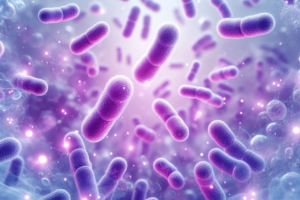BLM LrGG – A natural remedy
Diarrhea can be acute (usually with illness) or chronic due to health problems like irritable bowel syndrome or an intestinal disease, malabsorption (where the body is not able to absorb nutrients) or other autoimmune issues.
Various causes in children may include but are not limited to:
- Stress
- Trouble digesting food
- Food allergy
- An illness
- Side effects after consuming an antibiotic and/or any other medication
- Traveler’s diarrhea
Symptoms
Diarrhea can be usually accompanied by abdominal cramps, stomach pain, gas, nausea, bloating, fatigue and weight loss. Depending on the cause, symptoms may occur differently. If a child suffers from diarrhea, he/she may have large, running, frequent or watery poop. The color of the poop might also vary from shades of green and brown.
An acute condition may typically last for a few days but when it persists for a few weeks it becomes a chronic condition that needs to be addressed in order to avoid serious complications.
Types & Causes
Persistent and Acute diarrhea may have different causes compared to chronic diarrhea.
Acute and Persistent diarrhea
Most cases of watery, acute diarrhea are caused by viruses such as viral gastroenteritis. The most commonest in children are rotavirus and in adults are norovirus (this is also sometimes termed as “cruise ship diarrhea”). Various bacteria are a very common cause of traveller’s diarrhea.
Chronic diarrhea
Chronic diarrhea means having loose stools regularly for more than four weeks. Chronic bloody diarrhea may be caused due to inflammatory bowel disease (IBD). Other very less common causes include colon cancer or polyps, radiation therapy, infections and ischemia of the gut. Infections leading to chronic diarrhea are very uncommon, with the exception of parasites.
Irritable bowel syndrome (IBS) is a condition often associated with diarrhea, constipation or alternating diarrhea and constipation. Other common symptoms are bloating, abdominal pain, and also a sense of incomplete evacuation.
Treatment Regimen
Treating diarrhea depends on many factors, including their age, symptoms, general health and severity, but hydration is most important to be considered.
One who is suffering from diarrhea should consider that the most common thing is to stay hydrated. Drinking at least six glasses of water per day is mandatory. One should try avoiding caffeine, acidic juices and sodas. Avoid drinking while eating as it ultimately slows down your digestive system, try drinking at least 30 min before or after eating. Along with this also improve hygiene, adequate sanitation and routine vaccination (rotavirus vaccine).
One of the remedies to treat diarrhea is by use of probiotics : As we know probiotics are basically good bacteria. Probiotics play an essential role in gut health and also enhance immune health. Probiotics are mainly involved with the digestive system. As it helps to digest food and also prevents the entry of infectious bacterias. There are multiple probiotics which can be used to treat different diseases. Following is one of the best probiotics in India used for treating diarrhea, IBS-D etc.
BLM LrGG contains Lactobacillus rhamnosus GG which is effective for the treatment of diarrhea. LrGG has been used as a probiotic or “friendly bacteria “, to prevent the growth of harmful bacteria in stomach and intestines, also effective against diarrhea caused by rotavirus in babies and children. This product is possibly an effective aid for treating colic in babies, and in preventing diarrhea in children that occur while taking antibiotics. Few of the other conditions where LrGG is used is in irritable bowel syndrome, vaginal infections caused by bacteria or ulcerative colitis. LrGG is safe to be used across all age groups.
Potential health benefits and uses
L. rhamnosus has several potential benefits and multiple uses for our digestive system and other
health areas.
- May help to relieve IBS: Irritable bowel syndrome affects around 9-23% of adults worldwide. The causes for IBS are unknown, but the symptoms are very uncomfortable such as unusual bowel movements, abdominal pain and bloating. Human studies have shown that Lactobacillus- rich foods or supplements may relieve common IBS symptoms, such as abdominal pain.
- Treat and May prevent diarrhea: As per WHO, diarrhoeal disease is the second largest leading cause for deaths in children under five years. In most of the cases diarrhea is harmless, however persistent diarrhea can ultimately lead to fluid loss/dehydration. Studies have proven that L. rhamnosus may help to prevent or treat various types of diarrhea. L. rhamnosus may also protect against antibiotic-related diarrhea. Antibiotics can disrupt microbiota, which may result in digestive symptoms like diarrhea.
- Support gut health: Like other probiotic bacteria, L. rhamnosus is simply great for our digestive health. It belongs to the Lactobacillus family which produces lactic acid. Lactic acid helps to prevent the survival of potentially harmful bacteria in the digestive tract. L. rhamnosus helps to increase the production of short chain fatty acids (SCFAs) such as acetate, butyrate and propionate. These SCFAs are a source of nourishment for the cells lining the colon.
- May help to prevent UTIs: A urinary tract infection (UTI) can occur anywhere along the urinary tract, including kidneys, urethra and bladder. Some studies indicate that probiotics, including certain strains of L. rhamnosus, may also help to prevent UTIs by killing harmful bacteria and also restores vaginal flora. An analysis of 5 studies in 294 women found that several Lactobacillus bacteria, including L. rhamnosus, were safe and effective at preventing UTIs.
BLM LrGG is available in the form of drops and oro-melt sachets, it is recommended to take 7 drops a day for drops and one sachet a day for the best effect. The benefits offered are it helps in diarrhea, improves digestion and restores normal flora. It is an innovative dosage form i.e. oro-dispersible form- No need of water and oil drops-ease of administration in infants.
Reference:
- Schiller LR. Diarrhea. Medical Clinics of North America. 2000 Sep 1;84(5):1259-74.
- Stelzer T, Heuss LT. Chronische Diarrhoe. Therapeutische Umschau. 2014 Aug 25;71(9):537.
- Szajewska H, Canani RB, Guarino A, Hojsak I, Indrio F, Kolacek S, Shamir R, Vandenplas Y, Van Goudoever JB, Weizman Z. Probiotics for the prevention of antibiotic-associated diarrhea in children. Journal of pediatric gastroenterology and nutrition. 2016 Mar 1;62(3):495-506.
- Pedersen N, Andersen NN, Végh Z, Jensen L, Ankersen DV, Felding M, Simonsen MH, Burisch J, Munkholm P. Ehealth: low FODMAP diet vs Lactobacillus rhamnosus GG in irritable bowel syndrome. World Journal of Gastroenterology: WJG. 2014 Nov 21;20(43):16215
- Evans M, Salewski RP, Christman MC, Girard SA, Tompkins TA. Effectiveness of Lactobacillus helveticus and Lactobacillus rhamnosus for the management of antibiotic-associated diarrhoea in healthy adults: a randomised, double-blind, placebo-controlled trial. British journal of Nutrition. 2016 Jul;116(1):94-103.
- McNabney SM, Henagan TM. Short chain fatty acids in the colon and peripheral tissues: a focus on butyrate, colon cancer, obesity and insulin resistance. Nutrients. 2017 Dec 12;9(12):1348.
- Grin PM, Kowalewska PM, Alhazzan W, Fox-Robichaud AE. Lactobacillus for preventing recurrent urinary tract infections in women: meta-analysis. Can J Urol. 2013 Feb 1;20(1):6607-14.
- https://www.internationalglobalhealth.com/blog/diarrhea-and-chronic-diarrhea/
- https://gi.org/topics/diarrhea-acute-and-chronic/
- https://www.healthline.com/nutrition/lactobacillus-rhamnosus#benefits







